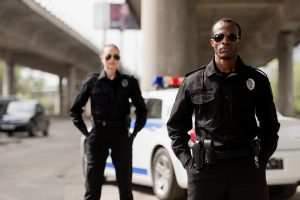One of the hottest topics today is policing the police and training them better to respond to crisis situations and better de-escalate and utilize less lethal force. This is a difficult situation no doubt. Police face tough situations and last second decision making under intense stress is a norm of their day. Police obviously deserve the utmost respect for the jobs they do in enforcement of law and protection but the fact remains their exists a strong divide among minority populations, and the overall population in general, with the men and women in blue.

This distrust has led to numerous confrontations with police auditors who push the limits with what an officer can ask and do. It also has led to confrontations in protests, defund the police marches, and the minority populations who sometimes are racially profiled. The old friendly “Andy of Mayberry” days seem to be a distant memory, or even a fairy tale, where officers policed the neighborhood and were seen as good guys. Instead, apprehension, anger and mistrust exist with every pull over or officer call. Much of this has to do with a few bad cops, who abuse their authority. The George Floyd case comes to mind, when officers brutally murdered a man in plain sight without any compassion or concern for the man’s breathing.
Like bad clergy or priests, bad cops are a minority, but they gain the spot light and also show a shade of blue society does not want policing them. This has only amplified the intense scrutiny on officers in regards to attitude, procedure and response to mental illness. Some cops although not corrupt are not fit to serve the population due to anger issues, procedural errors, or inability to respond properly during high stress. Many officers, especially ex soldiers, act as if they are in a state of war and throw orders and demands as if in the military to the civilians. These are not acceptable standards and are definitely issues when dealing with individuals who have mental illness. Quick to submit, dominate, or in worst cases, shoot have become too common.
Being a police officer is not easy. It not only demands the skills and mind to police, but it also takes a special person without authority issues, anger problems, or inability to act cool under pressure. The standards are high and many police perform at this standard, but it takes only one time, one bad day. This is why it is so hard for the good cops who try. At any moment, they may find themselves in internal affairs investigation, or subject to lawsuit, or find themselves arrested for excessive force. Hence it is equally important to the police officers, as well as the public to have better crisis response and de-escalation plans in effect.
The article, “Crisis Intervention Attempts Involving Policing In The United States” by Lisa Landram takes a closer look at how police departments are implementing better crisis training and policing procedures for their officers. Landram states,
“But many municipalities in the U.S. are also grappling with intervention attempts involving policing. Crisis response teams vary in their approaches to addressing mental health throughout the United States. A national survey by the National Police Foundation called “How Small Law Enforcement Agencies Respond to Calls Involving Person in Crisis” found that there were different approaches that agencies take to develop a more effective response to calls involving persons in behavioral health crisis. The findings from the survey are based on responses from a random sample of 380 municipal police and sheriff offices with between 10 and 75 sworn officers between February and October 2020.”
“Crisis Intervention Attempts Involving Policing In The United States”. Landram, L. (2023). Daily News-Record
To review the entire article, please click here
Commentary
Landram illustrates various ways local departments are answering the call to better train their officers and also implement better crisis response. Of the key elements, she notes that training involves recognition of basic mental illness is being implemented. The training involves not only the types but what to expect if encountering someone with mental illness or under substance abuse.
An additional training also includes teaching officers the basics in crisis intervention, communication and especially de-escalation. De-escalating at its core though means officers must become more “thick skinned” in regards to responses of individuals to orders, as well as ignoring insults or slurs. While it is horrible officers are verbally accosted, the job demands a high standard that some cannot meet, and for those, who cannot, then policing may not be one’s career, especially considering officers carry lethal force.

Another key element listed was the importance of a closer correlation with mental health professionals with the department. This partnership would involve officers having more support from mental health professionals via call, or in person on mental health calls. This also involves 911 and dispatch officers offering better details regarding a mental health call issue and warning the officers on scene that someone is not mentally well.
Finally, the department needs better cooperation for facilities that deal with substance abuse and mental health during a potential arrest. Jail is not the answer for these individuals and can in some cases traumatize them more.
Public Response to Officers
Most officers are good. Not all situations involve racial profiling, harassments, or cops with attitudes. Tickets may be annoying, but ultimately officers are performing a civic duty. While as US citizens we have certain rights, sometimes working with an officer is the best thing. Simple courtesy goes a long way. While police should not seek illicit information during an investigation or pull over that is not legal, they sometimes do and knowing your rights and what needs to be handed over or not is key. One always has the right to remain silent, but it is important to know one’s state laws requiring identification or pull over procedure.
Again, sometimes, working together and being compliant and respectful goes a long way. Realize officers live a high stress life and as human beings can reach a point where too much attitude or abuse pushes them over the limit. So, in essence, know your rights, but also understand the situation and what they are going through. Mutually working together can reduce stress, tension and anxiety.
Police Stressors
As stated, police are subject to horrible things they see everyday. They can suffer from PTSD and easily be triggered as well. It is obviously important that the department keeps officers in good mental health. Officers see death, abuse, shootings and live action on a consistent basis. They are in a fight or flight mode consistently. Traffic stops themselves may be their very last without proper care.
In addition to shootings, losing fellow officers, cops deal with a variety of other issues. Consistent verbal abuse, negative press, pressure from municipal authorities, and lack of staffing and funding. In essence it is an extremely stressful job and plays one component in the overall problem of de-escalation and policing. Hence departments must provide stress care in addition to crisis intervention training, to keep the minds and emotional stability of good cops sharp and healthy.
Conclusion
Policing is a sacred trust. A few bad officers can ruin the entire image but other officers need to learn better de-escalation skills. Certain qualities of officers need adjusted that are militaristic and ultra authoritarian. It is not fair, especially when dealing with a rude and ungrateful public, but the job demands more now than ever. Crisis Intervention skills protects not only the public but the officer him/herself.

AIHCP offers a Crisis Intervention Consulting Certification for qualified professionals seeking a four year certification. The program is online and independent study and open to qualified professionals seeking a four year certification. Police officers are excellent candidates as well for this program. Departments looking for certification programs for their officers can review the program and see if it matches the fit for their officers.
Additional Resources
“Police stressors and health: a state-of-the-art review”. Violanti, J. et. etc. (2019). Policing. Author manuscript; available in PMC 2019 Mar 5. Published in final edited form as: Policing. 2017 Nov; 40(4): 642–656. Access here
“Occupational stress in policing: What the research says and what leaders can do about it”. Segovia, R. (2022). Police1. Access here
“Fighting Stress in the Law Enforcement Community”. Dawson, J. (2019). National Institute of Justice Journal. Access here
“De-Escalation: A Commonsense Approach”. Ranalli, M. (2020). Lexipol. Access here
“If We Want to Reduce Deaths at Hands of Police, We Need to Reduce Traffic Stops”. Johnson, T & Johnson, N. (2023). Time. Access here
“Highly Rated and most Frequent Stressors among Police Officers: Gender Differences”. Violanti, J. et. etc. (2016). Am J Crim Justice. Author manuscript; available in PMC 2017 Dec 1) Published in final edited form as: Am J Crim Justice. 2016 Dec; 41(4): 645–662. Access here
